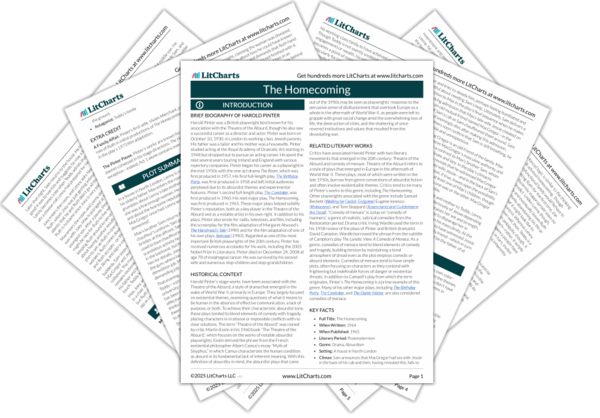Cigars and cigarettes represent the men’s sense of masculinity. Throughout the play, cigarettes or cigars, with their vaguely phallic shape, appear in scenes in which characters are trying to convey their own masculinity or undermine another character’s masculinity. In the exchange between Max and Lenny that begins the play, for instance, Lenny ignores Max’s request for a cigarette, a snubbing that symbolically communicates Lenny’s disrespect for his father. By denying Max the (phallic) cigarette, Lenny covertly shows Max that he no longer considers his father a man—which, according to the characters’ conventional grasp on hierarchy and gender roles, means that Lenny is no longer obligated to respect or obey Max.
Later in the play, after Max has praised Teddy and his successes in academia, Lenny points out that Teddy’s cigar has gone out, a seemingly innocuous observation that is in fact anything but. By making this observation, Lenny, who perhaps feels resentful about not measuring up to his successful older brother, implicitly seeks to retaliate against Teddy by humiliating and emasculating him. Teddy might be a successful professor, Lenny’s observation implicitly conveys, but he’s hardly a man: a real man—one with a career that demands manly physical prowess, say—would be able to keep his cigar lit. In pointing out that Teddy’s cigar has gone out, then, Lenny symbolically points out Teddy’s lacking masculinity while simultaneously reinforcing his own.
Cigars and Cigarettes Quotes in The Homecoming
I think I’ll have a fag. Give me a fag.
Pause.
I just asked you to give me a cigarette.
Pause.
Look what I’m lumbered with.
He takes a crumpled cigarette from his pocket.
I’m getting old, my word of honour.
He lights it.
You think I wasn’t a tearaway? I could have taken care of you, twice over. I’m still strong. You ask your Uncle Sam what I was. But at the same time I always had a kind heart. Always.










